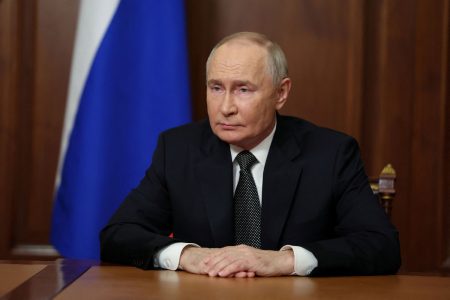Turkish President Recep Tayyip Erdogan chooses to open the fan of proclivities depending on the occasion, exploiting each of Ankara’s claims depending on the occasion and the audience. With Turkey’s objections to the demilitarization of the islands and the narrative of the “Blue Homeland” firmly on the table.
Among those that come up periodically, with the aim of contributing to the construction of the bellicose rhetoric that Ankara is trying to develop about the “Greek threat” are the Muslim minority in Thrace, the issue of terrorism, Greece’s weapons program, combined with alliances of, but also the Migration-Refugee.
With the Turkish side trying to utilize its entire agenda both in view of the 2023 elections in an attempt to disorient public opinion, as well as to consolidate a political tension that can be exploited in the diplomatic bargains attempted by Erdogan, such as for example with the USA.
On Monday, the Turkish president chose to “play” with the issue of Thrace and the Muslim minority, which he once again called “Turkish”, and called on the Islamic world to react to the “expulsion” of Muslims from Greece.
Turkish Defense Minister Hulusi Akar returned yesterday to the issue of Greece’s armaments, a favorite topic with Erdogan as well. Akar referred to Greek politicians as saying that they are doing everything they can to destabilize the peace between the two countries “with their penchant for armaments”. Akar reiterated that Ankara wants to maintain its contacts with Greece and is “holding out its hand for peace”, being in favor of a solution, however it will not allow a “fait accompli”, as he claims.
Erdogan’s representative, Ibrahim Kalin, also launched an attack on Greece, claiming that Turkey has no intention of clashing militarily with Greece, but “will leave nothing unanswered in every step taken in the opposite direction”. And in this context, he put on the table allegations against Athens regarding the violation of Turkey’s territorial waters, its airspace, violations of the Turkish border, but also “propaganda actions against Ankara”.
Kalin also placed Greece’s alliances in his crosshairs, calling on the US and France not to encourage Greece to adopt an “ill-advised attitude”, while at the same time pointing to the Erdoğan-Sisi handshake, the representative of the Turkish president referred to ” collapse of the anti-Turkish alliance” that Greece thought it could create. In this context, he gave as an example the EastMed Gas Forum, in which Turkey did not participate and according to the same objective had the “isolation and neutralization” of Ankara.
The message of the Greek foreign minister
Nikos Dendias sent his own message while attending the NATO Foreign Ministers Summit yesterday in Bucharest, underlining that the “conclusions from the Russian invasion of Ukraine is clear: revisionism has no place in the 21st century”. On the sidelines of the summit, Dendias had brief contacts with his counterparts from Spain, Italy, Croatia, Latvia, Luxembourg, Hungary, Romania and Slovenia. The Foreign Minister also had a meeting with his Canadian counterpart, Melanie Jolie, with whom they discussed bilateral relations and the Russian invasion of Ukraine, as well as the developments in the Eastern Mediterranean.
In the meetings of Dendias that stood out, the one with the US Assistant Secretary of State and former ambassador to Athens, Geoffrey Pyatt, with the subject of energy security issues in the shadow of the Ukrainian. Today and tomorrow the Foreign Minister will be in Poland for the OSCE Foreign Ministers’ Summit where he is expected to have a new barrage of contacts with his counterparts from Uzbekistan, Armenia, Tajikistan and Azerbaijan.


